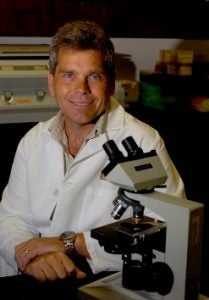Seven projects receive $172,500 in Brody Brothers Foundation Endowment research grants
GREENVILLE, N.C. — Seven research projects led by faculty at the Brody School of Medicine at East Carolina University have received grants from the Brody Brothers Foundation Endowment Fund at ECU totaling $172,500.
The grants were made possible through the income from an endowment established at the Medical Foundation of ECU by the Brody Brothers Foundation.

Dr. Richard Franklin of the Department of Microbiology and Immunology at the Brody School of Medicine is the primary investigator for one of seven projects funded by the Brody Brothers Foundation Endowment this year. Photo by Cliff Hollis.
Dr. John M. Lehman, associate dean for research and graduate studies at the Brody School of Medicine, said the caliber of the proposals that reached the final round for funding considering was impressive. Lehman is also associate vice chancellor for research for the ECU Health Sciences Division and aided the committee in their evaluation of the grant applications.
“There were 12 really good proposals that came to the final round, and it was a difficult decision for the committee,” he said. “The final seven projects selected, with the exception of one, focus on the major diseases of eastern North Carolina. What we are doing is trying to stimulate more information for diagnosis, treatment, therapy and understanding cancer, cardiovascular, obesity, diabetes and stroke.”
The following researchers were awarded grants:
— Dr. Brian Shewcuk of the Department of Biochemistry and Molecular Biology, who will investigate using a cell line from prostate cancer patient and how growth hormone affects certain genes in cell survival and cell death. His project was awarded $30,000.
Prostate cancer accounts for 32 percent of all cancer diagnosed in men. The incidence and mortality rates for prostate cancer in North Carolina are above the national average, with eastern North Carolina having rates twice the national average, according to Shewchuk.
“He is a new investigator to the Brody School of Medicine, and this was an outstanding application,” Lehman said.
— Dr. Rukiyah VanDross of the Department of Pharmacology and Toxicology, who received $23,000 in grant funding to study non-melanoma skin cancer. More than 1 million new cases of non-melanoma skin cancer are diagnosed each year in the United States, according to VanDross.
“Her research on non-melanoma skin cancer will focus on this particular fatty acid, looking at this pathway of fatty acid synthesis, and if this enzyme has any affect on cell death,” Lehman said.
Non-melanoma skin cancer includes basal- and squamous-cell carcinoma; both malignancies are believed to be caused by excessive sun and tanning bed exposure, she wrote in her grant proposal. In eastern North Carolina, the occurrence of non-melanoma skin cancer may be amplified due to increased sun exposure due to either work or recreation.
— Dr. Mariavittoria Pitzalis of the Department of Internal Medicine, Division of Cardiology, who will focus on the management of heart failure patients in eastern North Carolina, working to improve quality of life and decrease health care costs.
The proposal was granted $40,000. Other investigators for the project are Dr. Wayne Cascio of the Department of Internal Medicine, Division of Cardiology; Dr. Omur Cinar Elci, Dr. Lloyd Novick, H. Ruth Little, all of the Department of Family Medicine; and Dr. M. Akpinar-Elci of Greenville.
According to the grant proposal, in 2004, hospitalizations for heart failure in eastern North Carolina numbered 6,000 and affected women and minorities disproportionately. The project will focus on Pitt, Hertford and Edgecombe counties and aims to increase adherence to evidence-based heart failure medical guidelines during treatment, improve survival and quality of life for the patients, and decrease heart failure hospitalizations and deaths in rural eastern North Carolina.
The funding will allow for the development of a hub-and-spoke model to serve patients and primary care providers in eastern North Carolina and create a care network among the central heart failure clinic.